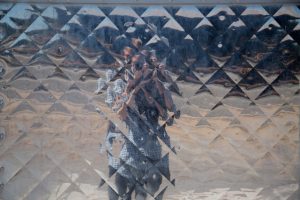Limit and Divide Us
Have you wondered why different people: white and Black, liberal and conservative, American Christians and Middle Eastern Muslims, see the world so differently? It’s because we’re not seeing the same world at all. Each of us sees reality through a series of boxes, made of stories we inherited from our ancestors, have learned since birth, and have had reinforced every day by society and the media.

Martin Woortman instagram.com/martfoto1
If we stay inside our boxes, we suffer in two ways. We can’t see the world as it really is, so we keep being hurt by it, and we miss its beauty. Second, everyone else in other boxes seems wrong and dangerous. This separation makes us easy to manipulate and is the source of much of our social conflict. If we understand the nature of the boxes we live in, we can better connect with others and experience the wonders of life.
Born in a box
Even before we’re born, we start to learn what the world is like. In his book, My Grandmother’s Hands, trauma therapist Resmaa Menakem, MSW, writes that children of traumatized parents are born already fearful of a scary world: vigilant against danger, unable to relax. They will teach their fear to their children. Whole communities can be traumatized by violence or dislocation, and most of them will see the world through that box of fear for generations to come.
Families and cultures vary in other ways, too. I was raised to think education was the most important thing in life; some of my working-class neighbors thought hard work was #1. As an adult, I’ve met others, often with less money, who focus on social connection as the way to survive. As a white-appearing child, I was taught to go to the police if I was lost or needed help. For good reason, some Black children learn the opposite.
These approaches represent different ways of trying to be safe in the world. All of them are based on some experiences a family or community has had. The original situations may or may not still exist, but the responses remain.
People from different boxes usually have no idea how the world looks to other people. White people who have never known many Black folks may not believe systemic racism exists. After all, they’ve never felt it. Rich people may not know any working people, and so usually have no idea what it’s like to lack money for food or to worry about paying rent. They can easily exclude such realities from their consciousness.
Thinking inside the box
Thoughts and behaviors that seem bizarre or evil to some make perfect sense to others inside their narrative boxes. I have long been baffled by this question: how could oil company executives suppress the science, some of it developed by their own researchers, that showed their products were heating the planet, with probable deadly effects? I knew corporations commonly value profits over lives, but in the case of oil companies, their products are killing their own children. How corrupt do you have to be to doom your own family?
Now, after reading and talking about it with some executive types, I begin to understand. You don’t have to be corrupt at all. You just have to keep thinking inside the boxes you were raised in, the ones society built around you and those you made for yourself.
The oil execs live in a capitalist box, in which progress is always good and accumulation of wealth defines success. Nested inside that box is a corporate box, in which their company, despite being a legal fiction, is a valuable thing which must be defended. Oil companies power people’s lives, after all, enabling us to get around in comfort. Inside the corporate box is a career box, in which money and prestige prove that the execs are good people.
Living in those boxes, the thought that burning oil is a bad thing is literally unthinkable. Those thoughts are easily kept at bay with simple disbelief (‘How could humans change the climate of this huge planet?’) with alternative belief systems (‘God is in control. He wants humans to prosper and wouldn’t let us kill ourselves.’) or alternative science (‘It’s not really that bad. The warming we see is just a natural cycle.’)
When society financially rewards you for what you do in your box, it’s harder to see outside it, especially when your friends, associates and family are in the box with you, and might get very angry if you try to climb out.
Part of the air we breathe
We all live in nested boxes, of which we’re usually unaware. We’re raised from birth to think our country is best. Our nationalities and our families’ political belief systems are the right ones. We’re taught those things in school, in church, at home, in the media. Religion (an important part of our worldview) is inherited. According to University of Southern California sociologist Vern Bengston, 50-90% of children keep the faith of their parents for life.
Seeing the world as we’ve learned it, we interpret our experiences to fit in with our beliefs. Soon, we don’t know our boxes are limiting our view; they’re like water to a fish, just the way things are, not open to question. We customize our boxes by adding on beliefs, which start as thoughts that fit what we already know.
Author Michelle May M.D. wrote on Huffpost, “Your thoughts lead to actions, which lead to results that confirm your initial thoughts. They become beliefs. Beliefs then become automatic thoughts that drive your behaviors. In other words, habits.” Once thoughts become habits, they become parts of our worldview, and opposing thoughts can’t get in.
In case we do start to question our beliefs, corporate media managers surround us with narrative walls to make sure we don’t see too far. These walls of story function like distorting windows. Through them, we can’t see the world as it is, only as the image-makers show it to us, usually as a scary place of scarcity and danger.

How we see the world – Image: Kaleb Nimz brewedtogether.com
Thinking outside our boxes is rare, as you can verify in five minutes on social media. Conservatives and liberals live in the same world, but see it through very different boxes. Republicans call progressives Libtards, and Democrats call conservatives Fascists. Our oligarchs thoughtfully provide each group with its own media outlets and information sources in both broadcast and social media form. As Andrew Marantz writes in his book Antisocial, algorithms and advertising work to put each of us in the boxes that are most comfortable for us, sometimes called ‘filter bubbles’ or ‘echo chambers.’ We wind up talking only with people who share our views.
My take on all this: the oligarchs know that people living in different boxes won’t unite against them. And the people creating those boxes live in boxes of their own, from which the things they do seem right, even socially necessary. But living in a box affects us beyond the political implications.
Personal boxes
In our personal lives, the most important boxes are the ones controlling who we think we are and what we should do. Some of these have been constructed over thousands of years. Society starts enclosing us at birth with walls such as gender roles: the different ways girls and boys should act and the way they should be treated. We learn very young what kind of person we should be when we grow up and what we should value in life. Our childhood and adult peers have their own boxes and try to mold our boxes to resemble theirs.
Nested inside those social boxes are more personal boxes that limit who we can be. The walls here are more like mirrors than windows. Am I a good person? Am I worthy of love? Do I need to be rich or poor, educated or religious, thin or fat, or what DO I need to do to feel good about myself?
Because the world seems dangerous, we sometimes create our own boxes to keep us safe. Sigmund Freud, founder of psychoanalysis, called these made-up boxes “neuroses.” If I think of myself as weak or incompetent, I won’t try things that are difficult or speak up for myself to others. That box protects me from risk but sadly limits what I can do and experience.
Can we get out of our boxes?
Buddhists say that seeing reality is a lifelong practice, kind of like what their monks do in their cells, but in the middle of fast-changing world with a hundred threats and a million spectacles to distract us. I personally don’t expect to get out of all my boxes any time soon.
What we can do is become aware of our own boxes and those of others. We can recognize that people with different beliefs have different histories and different sources of information, and so live in different boxes. They’re not stupid or evil. When we have unwanted thoughts or take automatic actions we can’t explain, we can realize that once-necessary but now outdated beliefs may be driving our behavior. We’re not weak or lacking in will power. We can do better. Here are some resources that might be useful.
Healing hidden trauma — Resmaa Menakem MSW LICSW My Grandmother’s Hands: Racialized Trauma and the Mending of Our Bodies and Hearts Central Recovery Press 2017
Having useful political conversations — The Aspen Institute Better Arguments Project “It’s Important to Speak to People You Don’t Agree With.” https://www.aspeninstitute.org/blog-posts/its-important-to-speak-to-people-you-dont-agree-with/
There are so many articles on changing harmful beliefs about ourselves (not so much about political beliefs.) Here is a good one – https://www.lifehack.org/858652/limiting-beliefs
A subreddit for actual discussions without attacks or name-calling is Change My View https://www.reddit.com/r/changemyview/
——————————-
Thanks for reading! I’ll be writing more about this soon. Follow me on medium.com/@davidsperorn, on Twitter, on Facebook or my blog The Inn by the Healing Path. Hire me for freelancing, editing, or tutoring on Linked In

Another good article, David! May I post it for you in Voices of Humanity? I noticed the phrase “the world as it really is”! Thanks especially for including that perspective.
As usual, solid work based on experience and a wealth of insight.
I finally looked at the Aspen Institute site and will explore its network more… Reddit, on the other hand, seems to devolve into snippy semantics pretty quickly. Not name-calling, and I appreciate that information is still being presented… tough to see if anything is actually being exchanged. E.g., no “I see your point” or “never thought of it that way” posts, just a back and forth